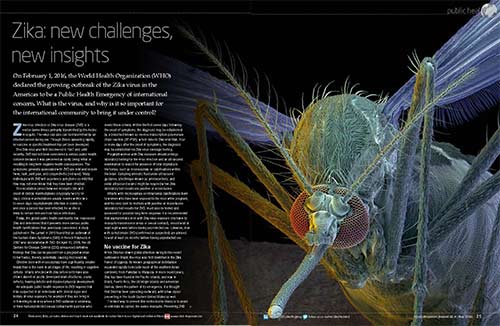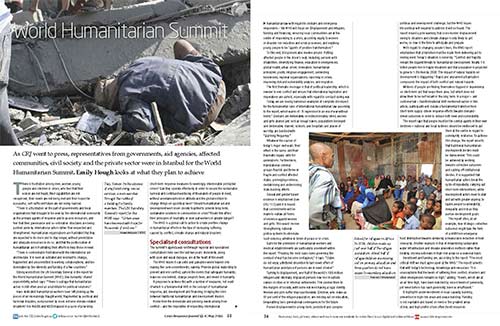CRJ 11:4 out soon
This issue’s three main themes feature a look at a changing humanitarian landscape in the light of the World Humanitarian Summit, security and terrorism, management and leadership and our popular R&D technology feature.
Our cover story is the Zika virus, written by CRJ’s Chief Scientific Editor Dr Ian Portelli and colleagues, who examine what exactly the Zika virus is, and why it is so important for the international community to bring it under control.
Here’s the rest of the issue’s contents in detail:

Features & Reports
Unified Response in London – Peter Cowup, Assistant Commissioner with London Fire Brigade, describes Exercise Unified Response, believed to be one of the largest and most complex emergency exercises ever to be held in the UK – possibly Europe.
Volunteers for oil spill response – Reita Waara, project manager for ‘Volunteer Participation in Oil Spill Response’ outlines how Finland has recognised the importance of volunteers and has created an operational model that includes a management structure for volunteers in large oil spill emergencies.
Cruise ship incident in the Falkland Islands – In November 2015, a stricken cruise ship lost power after an engine room fire and was left drifting in heavy seas. Andrew Almond-Bell, Director of Emergency Services and Island Security and Principal Immigration Officer for the Falkland Islands Government, describes the incident.
An unexpected lifesaving ally – Rats receive bad press, writes Frederik Keate of charity APOPO, but thanks to this NGO that trains rats in landmine and tuberculosis detection, they are becoming better known for more positive, lifesaving work.
Data to protect resilience in communities – Recent flooding of the Somerset Levels in the UK created a considerable challenge for many of the local communities. Ruth Cole asks whether community response can be predicted.
Rapid response anywhere and everywhere – Dr Jay Levinson and Professor Avi Domb focus on Hatzalah, a rapid first response system staffed by volunteers, which provides free medical care in emergencies.
Soufrière’s eruptions – Dr Dave Sloggett looks at how the authorities managed the aftermath of the eruption of the Soufrière Hills volcano in 1995, and at the preparedness of today’s diminished community that still lives on the island.
No more bandaids: Call for sustainable life practices – Christine Jessup calls for a paradigm shift in how society faces global crises, saying that the concept of mitigation is outdated and that we need to think bigger, change our risk levels and accept lifestyle change over short-term political expediency.

Humanitarian focus
World Humanitarian Summit – On May 23, 2016, representatives from governments, aid agencies, affected communities, civil society and the private sector gathered in Istanbul for the WHS. Emily Hough looks at what they plan to achieve.
Time for change? The Overseas Development Institute has released a comprehensive report calling for a complete rethink of the current humanitarian system, saying that incremental reform may no longer be enough. Emily Hough reports.
Learning from Haiti’s cholera crisis – Elizabeth Carthy suggests ways of ensuring that the country’s worst cholera epidemic is not repeated elsewhere.
Was 2015 a turning point for Pakistan? The number of militant attacks in Pakistan fell by 48 per cent when compared to 2014. What does this mean for NGOs operating in the country? Vittorio Oppizzi says the outlook may be more positive, but sounds a note of caution.
Leadership & Management
Picking the dream crisis team – This article by Rob Shimmin puts a microscope on the individuals tasked with making decisions in a crisis, looking closely at their personalities and how measurable traits might influence the way a decision is reached.
Leadership during crises – Strong leadership in a crisis can drastically improve response and recovery, while weak leadership can aggravate an already dire situation. This article examines effective and ineffective leaders in disasters and what we can learn from them. By Megan Mantaro, Kristina Dolan, Carly Esteves and Ian Portelli.
Entrepreneurial resilience – Professor Lee Miles of the Bournemouth University Disaster Management Centre, UK, examines the importance of innovation in disaster management, saying that entrepreneurial resilience makes an important contribution towards ensuring an organisation is fully agile and adaptive in an emergency.
Beyond command – Dr Eric J Russell contends that leaders within emergency services can help to promote mental resilience amid those who respond to traumatic incidents by creating a positive community in the workplace. Dr Russell is an Assistant Professor with Utah Valley University’s Department of Emergency Services, USA.
Responder welfare – Assessing stress in frontline responders should be the priority of every emergency organisation, says Catherine Thomas, MSc, Emergency Planning Officer for Public Health England.
Terrorism & Security
Suicide bomber targets families – On Easter Sunday a suicide bomber made his way to a park thronged with families, picked a crowded spot and detonated his device. More than 80 people were killed and 300 injured – most of them women and children, reports Luavut Zahid.
Terrorism, the threat picture – ‘Know yourself, know your allies and know your enemy,’ Sun Tzu’s advice still holds true in today’s terrorist risk landscape, writes Roger Gomm.
Can Europe learn from Israel’s experience? Meir Elran suggests that robust intelligence, strong resistance and protection measures, along with enhanced societal resilience, are key lessons that Europe can take from Israel’s counter-terrorism experience. BG (ret) Meir Elran is the Director of the Homeland Security Programme of the Institute for National Security Studies, affiliated with the Tel Aviv University and former Deputy Director of Military Intelligence and Chief of Staff of the Tel Aviv municipality, Israel.
Nigeria’s terrorism response – security specialist Oluadare Ogunlana traces the development of unrest, insurgency and the increase in terrorist attacks in Nigeria, saying that the government’s response to terrorism must involve more than military strategy alone.
Double attacks in Brussels – Lina Kolesnikova examines the March attacks in Brussels, highlighting signs that nuclear facilities may be on the list of prime targets.
Families and countering violent extremism – Emily Hough reports from the inaugural Families Against Terrorism and Violent Extremism (FATE) summit, where participants called for more emphasis upon families in counter-radicalisation initiatives and policies.
Technology

R&D: Drones for safety – Dr Ian Portelli, Carly Esteves and Megan Mantaro examine how the burgeoning potential of drones is providing ever greater opportunities for first responders, despite some concerns about their proliferation in private applications.
Artificial Intelligence – Michael McCabe of Intelligence Fusion says that although artificial intelligence brings real benefits in the security and resilience fields, it is unlikely that the human factor will become obsolete.
Lifesaving drones in Africa – Unmanned Aerial Vehicles (UAVs) or Remotely Piloted Air Systems, are becoming lifesavers in Africa, writes David Oliver.
Safer on The Strip – Tim Hall of GTT presents a case study on an upgraded traffic system for emergency responders in Las Vegas.
Innovations in communication – Humanitarian stakeholders face a number of interconnected current and emerging challenges, including climate change, refugee crises, water scarcity and food insecurity. These have put a spotlight on the role of communication, says Alina O’Keeffe of AIDF.
In Depth
Applications for emergency management support – In the first of his series, Stephen Johnson looks at how smartphone applications are revolutionising crisis communication and supporting emergency management across a variety of scenarios.
Terrorism: Assessed outcomes, desired impacts – Intelligence advisor Casey Brunelle says that by analysing acts of violence against soft targets, this two-part series aims to contribute to the urgent need to adapt a strategic understanding of the root causes and underlying symptoms of terrorism.
The Vienna Convention – Alina Alexe, Second Secretary, International Law and Treaties Department at the Ministry of Foreign Affairs, Romania, continues her examination of current international legislation with regard to the nuclear industry.
Responding to the unexpected – Ahead of this year’s CTIF Annual Delegates’ Assembly in Helsinki, Finland, Taina Hanhikoski looks at the history of this organisation, which dates back to 1900.
Homeland security experts gear up for Milipol Qatar – a look at the exhibition and conference, which take place on October 31 – November 2, 2016.
Looking back: The crash of TWA 800 – Tony Moore examines the continuing questions over what caused flight TWA 800 to explode into a ball of fire 12 minutes after take-off from JFK International Airport in July 1996.
Rethinking the global aid strategy – Lisa Hastert explains why the European Union has put forward more than 80 individual commitments to the World Humanitarian Summit, which started on May 23, 2016 in Istanbul, Turkey.
Frontline: Siberian Search and Rescue – This issue, Emily Hough talks to Aleksandr Kresan, leader of the Siberian Regional Search of Rescue Team in Russia, about preparations for the team’s Insarag External Classification later this year.